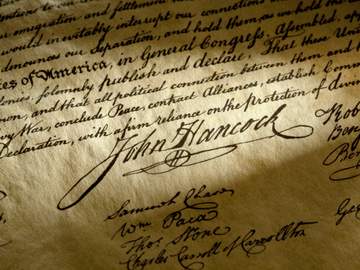
‘Flotilla’
Lookups for flotilla were high this week as the word was prominent in the news.
Israel on Monday deported the Swedish activist Greta Thunberg and about 170 other participants in a flotilla that tried to deliver aid by sea to Gaza but was intercepted by the Israeli authorities, the foreign ministry said.
—Ephrat Livni, The New York Times, 7 Oct. 2025
Flotilla refers to a fleet of ships or boats, and is used especially (though not in the instance above) for a navy organizational unit consisting of two or more squadrons of small warships. Flotilla can also be used figuratively for an indefinite large number, as in “a flotilla of changes.” The word comes from Spanish, where it is the diminutive of flota, meaning “fleet.”
‘Oeuvre’
Oeuvre was trending following the awarding of the Nobel Prize in Literature.
Laszlo Krasznahorkai, a Hungarian novelist known for his dark, apocalyptic themes and intricate sentences that can run on for pages, was awarded the Nobel Prize in Literature on Thursday. The Swedish Academy, which organizes the prize, said at a news conference that Krasznahorkai had received the award “for his compelling and visionary oeuvre that, in the midst of apocalyptic terror, reaffirms the power of art.”
—Alex Marshall, The New York Times, 9 Oct. 2025
We define oeuvre as “a substantial body of work constituting the lifework of a writer, an artist, or a composer.” The word is a borrowing from French, in which it means, literally, “work.”
‘Alderperson’
News out of Chicago has led to a rise in lookups for alderperson.
Alderperson Jessie Fuentes, a City Council member representing a historically Puerto Rican neighborhood, was handcuffed and detained by immigration agents after asking agents whether they had a warrant to arrest a local resident.
—Michael Loria, USA Today, 6 Oct. 2025
An alderperson is a member of a city legislative body. The alder portion of alderperson traces back to the Old English word ealdor, meaning “parent,” which in turn comes from eald, meaning “old.”
‘Vindictive’
Lookups for vindictive have been high as the word has appeared in the phrase “vindictive prosecution” in more than one news story.
Defense lawyers [for former FBI Director James Comey] said they intend to ask that the case be thrown out before trial on the grounds that it amounts to a vindictive prosecution and to challenge the appointment of the prosecutor who brought it after being hastily named to the post days earlier by Trump.
—Eric Tucker et al., The Associated Press, 8 Oct. 2025
Separately, a judge in the Tennessee criminal case ruled this past week that the “totality of events” created a “realistic likelihood” of vindictive prosecution by the government, entitling [Kilmar] Abrego Garcia to discovery and a hearing before a decision is made on his lawyers' motion to dismiss.
—Danielle Shockey, The Tampa (Florida) Free Press, 6 Oct. 2025
We define the relevant sense of vindictive as “intended for or involving revenge.” Vindictive can also describe a person who is disposed to seek revenge, or be used as a synonym of spiteful to mean “intended to cause anguish or hurt.”
‘Plenary’
Plenary became a top lookup after the word was used by Stephen Miller, the White House’s deputy chief of staff for policy.
President can federalize the National Guard of a state only if specific conditions are met, such as insurrection, rebellion, invasion, inability to execute federal laws. He is arguing, as Stephen Miller did yesterday on CNN, in effect that his decisions are plenary in those—in those instances, and courts cannot review them.
—Ron Brownstein, CNN (transcript), 8 Oct. 2025
We define the relevant sense of the adjective plenary as a synonym of absolute meaning “complete in every respect.” The word traces back to the Latin plēnus, meaning “full.”
Word Worth Knowing: ‘Paraph’
If you enjoy adding a little pizazz, flair, or even just an extra squiggle to the end of your signature, there’s a word for that: paraph, which we define as “a flourish at the end of a signature.” Paraph entered English in the late 1500s from Middle French, and is a modification of the Latin paragraphus, meaning “paragraph.”
[John Hancock’s] refined handwriting indicated that he was a gentleman—he knew how to maximize the downstrokes and avoid ink blots. It showed training and practice and required a steady hand; the flourish underneath his name, called a paraph, was a way to further display gentility.
—Brooke Barbier, King Hancock: The Radical Influence of a Moderate Founding Father, 2023




